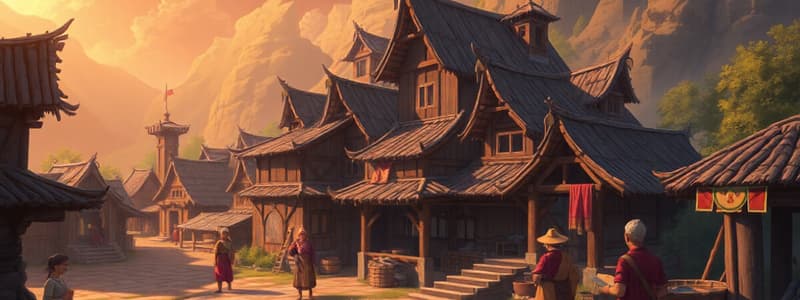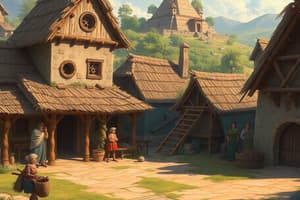Podcast
Questions and Answers
Which of the following is NOT a defining characteristic of a complex village?
Which of the following is NOT a defining characteristic of a complex village?
- A larger population
- Limited trade (correct)
- Specialized work
- Different social classes
In the context of simple and complex villages, what is the primary purpose of government?
In the context of simple and complex villages, what is the primary purpose of government?
- To manage the distribution of food and resources
- To establish a hierarchy among social classes
- To ensure safety and order within the community (correct)
- To regulate religious practices
Which of the following accurately describes the connection between social class and skill in complex villages?
Which of the following accurately describes the connection between social class and skill in complex villages?
- Social class is determined solely by income, regardless of skills.
- Skilled individuals, such as artisans, are often found in the higher social classes. (correct)
- Individuals in higher social classes are always skilled artisans.
- Skills are unimportant in determining social class in complex villages.
How does the presence of artisans contribute to the growth of complex villages?
How does the presence of artisans contribute to the growth of complex villages?
Which of the following accurately reflects the progression from simple villages to complex villages?
Which of the following accurately reflects the progression from simple villages to complex villages?
Imagine a village where everyone performs the same tasks and there is no specialized work. What can we infer about this village?
Imagine a village where everyone performs the same tasks and there is no specialized work. What can we infer about this village?
How does the development of social classes in complex villages impact the lives of its inhabitants?
How does the development of social classes in complex villages impact the lives of its inhabitants?
Flashcards
Simple Village
Simple Village
A small population with limited specialized work and trade.
Complex Village
Complex Village
A larger population with increased trade and specialized skills leading to social classes.
Artisan
Artisan
A person trained in a specific skill or craft.
Examples of Artisan Skills
Examples of Artisan Skills
Signup and view all the flashcards
Social Class
Social Class
Signup and view all the flashcards
Higher Social Class
Higher Social Class
Signup and view all the flashcards
Purpose of Government
Purpose of Government
Signup and view all the flashcards
Study Notes
Simple Villages to Complex Villages
- Early villages were simple due to small populations and limited specialization
- Extra food and supplies led to increased trade and population growth
- As populations grew, people became more specialized in skills (potters, weavers, craftsmen)
- Artisans (e.g., carpenters, potters, cloth makers) were skilled workers
- Social classes developed, with respected artisans in higher classes, and less skilled in lower classes
- Holy people were highly respected
- Village leaders emerged to maintain order and safety, establishing early forms of government
- Villages eventually became more complex with laws, social classes, and skilled workers.
Questions
- Simple vs. Complex Villages: Simple villages had smaller populations and less specialization. Complex villages had larger populations, diverse skill sets, clear social classes, and governing structures.
- Artisan Definition: Skilled workers like potters, weavers, and craftsmen, whose skills are needed to provide supplies and services
- Social Class Definition: A group of people sharing similar skills, backgrounds, income, and customs
- Government Creation: Early forms of government developed to maintain order and safety, addressing the needs of larger, more complex villages.
Studying That Suits You
Use AI to generate personalized quizzes and flashcards to suit your learning preferences.




